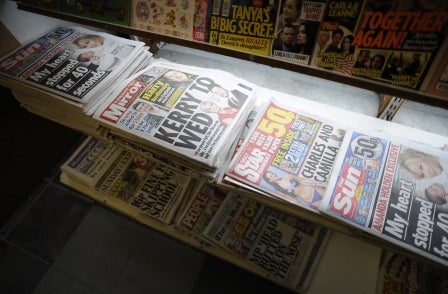
Pressure group Liberty today urged the Government to scrap plans for a Royal Charter-backed system of press regulation.
Instead the group, whose director Chami Chakrabarti was one of the six Leveson Inquiry assessors, has called for a system of self regulation run by the industry itself along broad principles. This would be recognised by the courts under criteria set out in a new piece of legislation.
Chakrabarti said: “Six months on and still no sign of any real progress – and current squabbling over bizarre Royal Charters has achieved nothing but confusion and resentment.
“The Leveson Report contained an effective blueprint for a decent self-regulator so why hasn’t it been set up? Victims and ethical journalists need protection and the public needs confidence restored – every day politicians and press barons prevaricate is another letting everyone down"
Liberty said that both Royal Charters set out an “overly complex and bureaucratic system – which reflects the interests of the creator..For example, the press model would have the body funded by the press, whereas the politicians’ version would be funded from the Exchequer. “
Liberty has condemned the Royal Charter route to press regulation as “non-transparent and undemocratic” and also “un-British”.
Liberty also said today that it favours the threat of exemplary damages against publishers who are not members of a recognised press regulator, otherwise the new system could “collapse under the weight of collective industry apathy”.
The pressure group’s report states:
There is apparent agreement between the press, the politicians and Lord Justice Leveson about the basic structure of a scheme designed to facilitate effective self-regulation of the press.
The three component parts of the scheme are (i) a ‘recognition body’ with responsibility for judging whether a self-regulator meets a number of criteria, (ii) a series of ‘recognition criteria’ designed to set out the minimum standards a regulator will need to meet to be recognised and (iii) the creation of one or more independent self-regulators which set and enforce standards for those publishers which choose to join up.
At a more fundamental level, Liberty believes there is also wide-spread agreement about the purpose of the scheme: to preserve a thriving, free press, but hold it accountable where it breaches individual rights.”
Rather than continue getting bogged down in detailed argument between publishers and politicians, Liberty suggests instead that it should be up the courts to decide whether the regulator meets certain principles.
Lord Justice Leveson envisaged a series of principles, comprising effectiveness, fairness, objectivity, independence, transparency, credibility of powers and remedies, reliability of funding and accountability. Liberty believes that these criteria capture, very well, the essence of effective regulation. These are principles capable of shaping regulation, without being overly prescriptive.”
Defending its suggestion that the Liberty press regulation plan be underpinned by press regulation, the groups says:
Liberty believes that a greater degree of honesty and transparency is needed in this debate. The only real obstacle to including a few broad recognition criteria in legislation is the misconceived perception that implementing any aspects of the Leveson proposals through statute will amount to statutory regulation of the press. The reality is that this simpler way of setting out recognition criteria, is also better and no more a hostage to fortune (or future Parliaments) than a Royal Charter backed by convoluted, unconstitutional and un-British procedural requirements."
Consultation by the Privy Council on the industry Royal Charter for press regulation concludes at the end of this week. The Parliament-backed press regulation Royal Charter, agreed in a cross-party deal in March, has yet to be submittted to the Privy Council for approval.
Email pged@pressgazette.co.uk to point out mistakes, provide story tips or send in a letter for publication on our "Letters Page" blog
